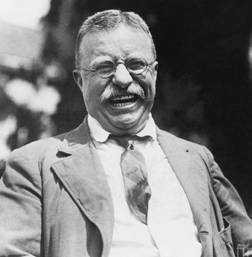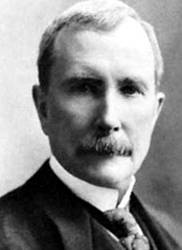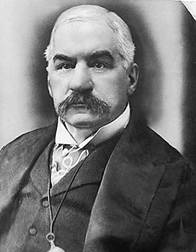TEDDY ROOSEVELT: US Statism’s Seductive Founder
Politics / US Politics Nov 28, 2013 - 10:30 AM GMTBy: Stephen_Merrill
 A recent work sought to identify and rank in a way the few US Presidents over the past century plus whose policies led to greater freedom in the economy. That list did not include, Theodore Roosevelt, TR, the trust-busting lion and hero of San Juan Hill.
A recent work sought to identify and rank in a way the few US Presidents over the past century plus whose policies led to greater freedom in the economy. That list did not include, Theodore Roosevelt, TR, the trust-busting lion and hero of San Juan Hill.
To the consternation of many, the work ranked two Democrats, Jimmy Carter and Harry Truman, as possibly the greatest presidential freedom fighters for the economy since 1900. Supporters of several presidents claim other names should have been included, Teddy Roosevelt for one, Ronald Reagan for another and even Bill Clinton.
The guiding hand of both Reagan and Clinton policies in creating our present corrupt financial system and the ongoing debt and currency catastrophe plainly excludes both presidents from freedom fighter credentials overall. Reagan’s false credentials for such a claim have already been written about by this author. Clinton’s sole credential for the list, his somewhat balanced budgets, was plainly more due to divided government that to a real change of habits in Washington led by Clinton.
Reagan appointed Alan Greenspan as Fed Chair. Clinton reappointed Greenspan. Those acts alone rank both Presidents as class-warrior statists for the rich.
With his taking the Sherman Anti-Trust Act off the shelf long before the Federal Reserve was created, TR though does deserve analysis as an economic freedom fighter overall I concede, if not ultimately a place on the list with the previous four presidents.
A Hero from the Ruling Class

One thing is quite certain; Teddy Roosevelt (1858 – 1919) was the most manly political figure in US history.
TR left the safety of his Secretary of the Navy post in 1887 to bravely lead the winning cavalry charge against the Spanish in McKinley’s US war of aggression.
As president, TR subjugated the people of The Philippines mercilessly, as well as trouncing on Central America sovereignty several times with the Roosevelt Corollary to the Monroe Doctrine and the covert creation by TR of the nation of Panama.
TR hunted rhinos in Africa and lived the life of a rancher in the Dakota Territories.
TR was the president who saved US football from extinction, one of his many passions, by forcing through Presidential demand changes to the rules of the game, including the forward pass
TR had begun life though as an asthmatic, clumsy boy. He was born into a family already in the center of wealth and political authority in the United States.
TR from adolescence purposely put aside the easy life he was born to in favor of endless exploring and conquering both beast and man. This love of the hard life never ended for TR.
In politics, TR fought even more dangerous prey than wild animals by far in the JP Morgan banking monolith and John D. Rockefeller's Standard Oil.


TR’s life was a struggle in politics from beginning to end as well, the President who ran a Bull Moose Party campaign after already serving two terms in the Presidency, all to defeat the man, President William Howard Taft, TR had endorsed as his Republican successor in office.
TR was lucky enough to be the first President to seriously take up one of the two state interventions that a truly free economy does need; anti-trust law. Monopoly busting, properly imposed, is pro-liberty, though a messy top-down affair in its application in practice so far.
But the long term benefits of ending monopoly/oligopoly market control can be seen by those Americans of a certain age today that can remember the vitality, innovation and costs of the telecommunications industry before the breakup of the AT&T “ Ma Bell” monopoly. Ma Bell, left on its own, might still be offering the nation only landline phones for monthly rent and user fees, especially for long-distance calls.
Succeeding William McKinley as President after McKinley’s assassination in 1901, TR’s Sherman Act suits against Rockefeller’s Standard Oil and Northern Securities, a railroad conglomerate, were largely successful and wildly popular. The resulting diversification of markets, services and products served the national economy well in the long run.
Though the Sherman Act had been enacted in 1890 the administrations of Benjamin Harrison and McKinley had no spirit for trust-busting, unlike Roosevelt.
TR was also a natural conservationist, the founder of the first national parks. So, the other state intervention a free economy actually needs, environmental protection, was also a first of sorts by TR.
With both of these policy areas one must also wonder if TR left a heavy-handed legacy to the few interventions in the economy that are needed. No political figure embodies the top-down approach more than TR.
Maybe new legislation by TR encouraging competition in oil and kerosene production and sale would have been more effective and less harmful than the trust busting approach TR took.
Establishing government-owned, rule-bound, patrolled national parks is also an entirely top-down approach to a great national need.
Maybe TR could have accomplished more than a rhetorical war against the parasitic banking of the time if he had ever pushed for more bottom-up ways to do so.
This great figure's dichotomy is maybe best expressed by TR's own prediction concerning the possible causes of the future downfall of the American spirit
"The things that will destroy America are prosperity at any price, peace at any price, safety first instead of duty first, the love of soft living, and the get-rich-quick theory of life.” TR, 1918
TR never mentions the loss of liberty as a likely cause of American decline, should it happen. His list of America’s ills looks vacuous now as the US empire falters. The world's salvation turned out not to be TR's world of elitism across the globe, far from it.
TR's imperialism led the nation to a bitter century of war across the world. It is ending now in the final disasters for the US foreign empire.
TR's taunting of America's yearning for peace rings loudly now a century later.
So, the final words by TR about America proved invalid and hollow, harmful to the American spirit of independence.
TR’s vision did not work out for the nation nearly as well the breaking up of Standard Oil and the founding of the national parks did.
TR’s story did not end in 1919 with his death. His ongoing legacy spans more than a century.
TRs successful, popular free market interventions by the federal government bred the horrific hubris of Woodrow Wilson and even the founding of the nation's greatest bane ever 100 years ago, the third national bank of the United States, a growing parasite as never before. Wilson bred FDR and then on to LBJ and Obamacare.
A tribalist statist warmonger in the end, Teddy Roosevelt, true man that he was, cannot join a list of Presidents who benefited the US economy overall. In a large way, TR served as the seed corn for US elitism that is only now reaching its terminal stage.
It is the history of the Progressive Movement from its founding by TR all of the way to today’s Too Big to Jail and Welfare State world. Editor
Mr. Merrill served in the Navy Judge Advocate General’s Corps and as a Navy Reserve Intelligence Officer.
Mr. Merrill is the editor of the Alaska Freedom News, formerly the Hampton Roads Freedom News.
© 2013 Copyright Stephen Merrill - All Rights Reserved
Disclaimer: The above is a matter of opinion provided for general information purposes only and is not intended as investment advice. Information and analysis above are derived from sources and utilising methods believed to be reliable, but we cannot accept responsibility for any losses you may incur as a result of this analysis. Individuals should consult with their personal financial advisors.
© 2005-2022 http://www.MarketOracle.co.uk - The Market Oracle is a FREE Daily Financial Markets Analysis & Forecasting online publication.



